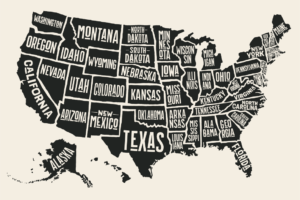When thinking of opening a cannabis business, you may think taxes are like that of any other industry. But…that couldn’t be further from the truth. Even though cannabis is now legal in many states, it’s still federally illegal. Making the process of filing federal taxes that much more difficult. So, what are the top four things to know about marijuana business taxes? Let’s brush up on the most important factors to keep in mind year-round for IRS and state tax success. 
#1 – Not every state collects cannabis taxes
Even though 33 states have now legalized medical or recreational marijuana – not all of them collect their own taxes. Currently, medical sales aren’t taxed in states like Vermont, Maine and D.C., which is actually prohibited from collecting taxes. Recreational sales, however, are typically subject to a state tax and local tax that can differ by type. Which means, learning the exact ins and outs of cannabis taxation for your state and local region is crucial in the initial stages of setting up your retail location, or marijuana business.
#2 – Get to know IRS Code 280-E
One of the most highly debated tax issues for cannabis businesses continues to be IRS tax code 280-E. This code specifically sets limitations for any “businesses that traffic marijuana in contravention of federal or state law.” The biggest limitation is that cannabis businesses are limited in several deductions they can claim. Since this code essentially forces cannabis businesses to pay income taxes on their gross profit vs. net profit, rates can reach up to 90%+ annually. To circumvent the issue, experts recommend the legalization of marjiuana, removing the Schedule 1 classification, or making exceptions for states with legalization.
 #3 – Reporting large cash transactions
#3 – Reporting large cash transactions
With a lack of banking resources, many transactions in the cannabis industry are done so in cash. Of which the IRS, of course, wants to be aware. The IRS explicitly requires any “person in a trade or business who receives more than $10,000 in cash in a single transaction or in related transactions must file Form 8300.” The form must be filed within 15 days of making the transaction, making it even more important for owners to recognize/remember. Luckily, the IRS now offers options for “unbanked” taxpayers that allows cannabis businesses to pay their taxes in cash too, if need be.
All in all, to ensure you avoid any issues with cannabis business tax, it’s best to keep good records. While this may be a given for any industry, it’s even more crucial for marijuana businesses seeking to reduce their taxes as much as possible with current codes. It’s also highly advisable to seek professional help for filing and keeping up with tax payments throughout the year (vs. all at once). This includes using a comprehensive POS or internal system that calculates taxes automatically based on your retail storefront sales.
Looking Ahead for Cannabis & Taxes
With new movement for the federal SAFE banking act and talks of federal legalization – it could be sooner than later for cannabis business tax reform. So, if you’re a business owner who’s frustrated with the current state of cannabis tax affairs, it’s time to get vocal. Join advocacy groups that support legislation in favor of business reform or, at the very least, seek the help of consultants well-versed on the topic. Partner with Coyle now to begin reducing industry risk for taxes, compliance and more.














